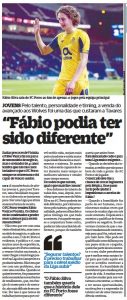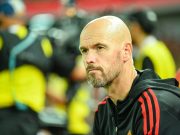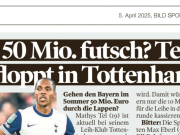Portuguese newspaper O Jogo today features an interview with José Tavares.
The coach, who’s leaving Porto after 14 years at the club, worked at many positions at the Dragons, and used to be the coordinator of their youth ranks.
That means the official knows a lot about the youngsters who left the institution in the past few years, and a part of the interview was asked about the moves to Wolverhampton Wanderers.
That’s because the outlet wanted to speak about Vitinha and Fabio Silva.
Tavares first talked about those deals with Wolves, claiming it’s likely Porto will need to let talented youngsters go in order to keep a good financial situation at the club.
“It doesn’t have to do with an eliminatory vision, but with the business model, and everyone chooses their own. FC Porto’s is evident, it’s public and it is, with many years of experience, so FC Porto continues to win national titles, dare to go as far as possible in the Champions League and produce talent. It’s not about a problem, it’s about a choice,” Tavares told O Jogo.
“When you want to invest, you will inevitably need new sources of income, which, depending on our country and the market, are more difficult to find. That’s why we have to work together so that the average level goes up, more sponsors appear and there is greater financial capacity to move the system. If so, everyone will be able to retain the best talent longer and sell in less time.”
Tavares was then asked about the youngster whose departure from Porto hurt him more, and he had to go for Fabio Silva, who moved to Wolves on a €40m deal in 2020.
 “I’m a supporter of their talent, but then I recognise that Fabio Silva’s path at FC Porto could have been different, for several reasons: because of his talent, his personality, his choices and the timings in which everything happened.
“I’m a supporter of their talent, but then I recognise that Fabio Silva’s path at FC Porto could have been different, for several reasons: because of his talent, his personality, his choices and the timings in which everything happened.
“It was the one in which, if the situation had been different, it could have had a different story, because he also wanted it to be that way. He left too soon and for a very demanding league…”
Silva has since left Wolves to move to Belgium, where he’s set to gain more experience during a loan at Anderlecht.
Tavares was quizzed if this move will be good for the player to boost his career.
“When humility is part of being human, we often recognise that we have to change something in ourselves or in the context. Then it will be the exterior to be qualified in a positive or negative way. If we’re aware that the best thing is to change the context, whatever it is, it will always be fine.
“It cannot be qualified as a failure or a step backwards if the player, who is part of his context and his club understand that it’s better to be elsewhere so that everything in which he believes continues to happen.
“It’s the humility to recognise that change is part of life, and it is often necessary to change in order to find ourselves again, to grow, to have new opportunities, motivations and the expression of talent to be of continuous transcendence.”

























